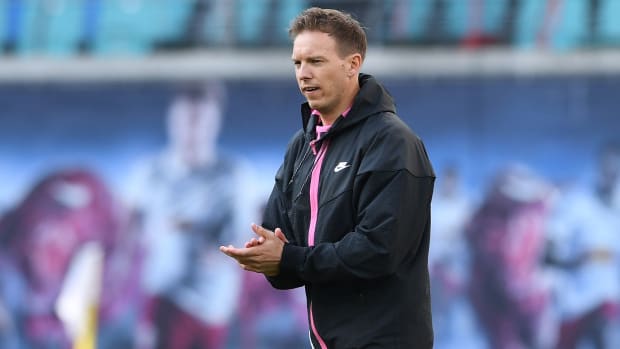Julian Nagelsmann is leaving RB Leipzig for Bayern Munich this summer, with the coaching sensation the latest example of Bayern's irresistible lure in Germany.
There never seemed much doubt that Julian Nagelsmann would end up managing Bayern Munich at some point. As it turns out, he will take over in the summer, shortly before he turns 34. It’s an extraordinary rise for the brightest of all the bright young German coaches, but it’s also a reminder that, in Germany, talent inevitably finds itself drawn to Bayern. The status quo is far preferable to the proposed Super League, but it is not perfect.
RB Leipzig will, almost certainly, finish second in the Bundesliga this season. It is wealthy and well-run and has, to widespread unease, effectively maneuvered around Germany’s 50+1 ownership regulation that ensures all clubs must abide by the wishes of their fans. And yet even it cannot resist. For Bayern, the policy is clear: when a rival emerges, it buys its best player, strengthening not only itself but weakening the opposition. French central defender Dayot Upamecano had already agreed to leave Leipzig for Munich this summer, just as Mats Hummels, Mario Götze and Robert Lewandowski all left Borussia Dortmund for Bayern between 2012 and 2017. Now, it's applied that approach to land its next manager.
Leipzig’s owner, Dietrich Mateschitz, had initially tried to resist, calling a member of the Bayern board last month to insist that Nagelsmann was staying put. But Nagelsmann was a Bayern fan as a child and has played the diplomatic game well, making sure he never offended the club even when it seemed in late autumn that a title race may be developing. Once Leipzig had accepted there was no point holding onto a manager against his will, the only question was the level of compensation paid. Agreement was reached at a reported $24.1 million, a record for a manager and four times more than Leipzig had paid Hoffenheim for Nagelsmann in 2019.

Nagelsmann takes over a club that is on the cusp of its ninth straight Bundesliga title. Domestic success is taken as a given. Bayern, like so many of the super clubs, is interested really only in winning the Champions League. Hansi Flick’s departure, which he had requested with two years to run on his deal as reports connect him to the soon-to-be-vacant Germany national job, became apparent after an away-goals defeat to Paris Saint-Germain in this season’s quarterfinals. The main reason, though, was said to be a strained relationship with club sporting director Hasan Salihamidžić.
The two clashed over recruitment policy, although Flick last week defended the sporting director against abuse from fans after a petition was raised with 70,000 signatures calling for his departure. However that plays out, there are clear issues within a squad that has come to feel a little thin. Flick, notably, opposed the decision to allow Jérôme Boateng to leave in a free transfer. Upamecano will take Boateng’s place in the squad, but with David Alaba also leaving this summer, Bayern is losing two long-term servants.
Stylistically, Nagelsmann is a clear fit. Since the appointment of Pep Guardiola in 2013, Bayern has sought to be at the forefront of the pressing school, which has now become the dominant mode in German football and has been exported via the likes of Jürgen Klopp and Thomas Tuchel. Nagelsmann is a practitioner of that philosophy. It’s why he was approached by Bayern in 2015 to work as under-19 coach, a job he was seemingly keen to take only for Hoffenheim to refuse to let him leave. He was then lined up in 2018 to replace Jupp Heynckes, only for more conservative members of Bayern’s board to question whether he had sufficient experience.
That must remain a slight concern. The one blot on Nagelsmann’s record so far is his failure in the very biggest games. The sample size is very limited, but both against PSG in last season’s Champions League semifinal and against Liverpool in this season’s last 16 (the latter of which came after Timo Werner's summer departure to Chelsea), Leipzig was well-beaten. It wasn’t so much that it lost, as the sense that it had failed to even begin to reach its usual level.
A five-year contract, meanwhile, is a huge vote of confidence from Bayern, given no manager since Ottmar Hitzfeld two decades ago has lasted more than three years in the job. Nagelsmann’s youth and energy presumably count for him as does his innate affection for the club. If he can navigate the treacherous politics at the club and find a way for his side to impose itself in the biggest games, this could be the beginning of a dynasty.
But like all Bayern coaches now, Nagelsmann will find himself in the odd position of being judged on only a handful of big European games. The Bundesliga title is taken as a given. It is the latter stages of the Champions League that will define him.
More Soccer Coverage: